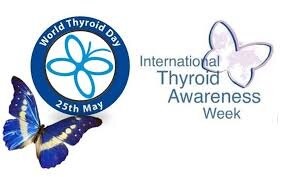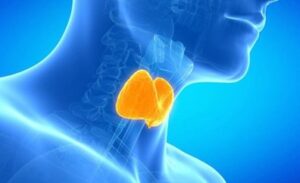International thyroid awareness Day 2021
The thyroid gland is one of the most important and effective glands in the body. This butterfly-shaped gland, located in the front of the neck and is responsible for producing two important hormones, thyroxine and triiodothyronine. Due to the vital role of this gland, if its function is disturbed, the body’s function will be affected. Thyroid disease is one of the most common medical diseases that many people do not know enough about. In this regard, the following is a brief introduction to thyroid disease and its diagnosis methods.
Familiarity with the functions of the thyroid gland
The thyroid gland consists of two loops that are connected by a small bridge called the Isthmus. As mentioned, the thyroid gland is responsible for making two important hormones in the body, thyroxine, and triiodothyronine. These hormones contribute to the normal functioning of all cells in the body. In addition to the two hormones, this gland also produces the hormones T3, T4, and calcitonin which is involved in regulating blood calcium levels. Therefore, it can be said that hormones secreted by the thyroid gland affect the regulation of cell function and cellular metabolism.
Types of thyroid diseases
The thyroid gland, like other parts of the body, can have problems. By becoming aware of the symptoms of thyroid disease, serious diseases can be prevented. The following is a brief introduction to thyroid disease, the study of which is not without worth.
Hypothyroidism
Among thyroid diseases, hypothyroidism is the most common. This condition occurs when the secretion of thyroid hormones decreases. The disease manifests itself with a variety of symptoms, including the following:
- Decreased appetite
- Weight loss
- Excessive fatigue
- Memory impairment
- Depression
- Sensitivity to cold
Hyperthyroidism
Unlike hypothyroidism, hyperthyroidism reveals itself by an increase for hormones secreted by this gland. However, the most important symptoms of this disease are as follows:
- Overactive
- Overeating
- Weight gain
- Sensitivity to heat
Graves
Graves’ disease is a thyroid disease that falls into the category of autoimmune diseases. The disease has symptoms similar to hyperthyroidism because it causes an increase in the secretion of thyroid hormones. It should be noted that this disease, like other autoimmune diseases, is more common in women.
Hashimoto
Hashimoto’s is an autoimmune disease that occurs in the thyroid gland. The cause of the disease is still under investigation, but many attribute it to the growth of bacteria or viruses. Other researchers also believe that heredity is the cause of this disease. Nevertheless, the symptoms of this disease include the following:
- Weight gain
- Depression
- Sensitivity to heat and cold
- Dry skin
- Paleness
- Sleepiness of limbs
- Bruising
- The feeling of sudden panic
- Slow or rapid heartbeat
- Increases blood cholesterol and lowers blood sugar
- Weakness or muscle cramps
- Memory weakness
- Hair loss
Thyroid nodules
Other thyroid diseases include thyroid nodules. Thyroid nodules appear as nodules or lumps in the thyroid gland and can be seen in multiple and single forms. Although the nature of these masses is harmless, they may sometimes change from benign to malignant. The disease manifests itself with the following symptoms:
- Sudden weight loss
- Excessive sweating
- Body Shaking
- Anger
- Rapid and irregular heartbeat (arrhythmia)
Goiter
Goiter occurs if the thyroid gland becomes larger than normal in size. Goiter has a negative effect on breathing and swallowing, but its presence is not associated with pain. The symptoms of this disease are as follows:
- Swelling at the base of the neck
- Feeling tight in the throat
- Cough
- There is difficulty in swallowing
- Problems breathing
Thyroid cancer
Cancer is caused by abnormal cell growth and can be divided into benign and malignant. If there is an abnormal growth in the cells of the thyroid gland, thyroid cancer can be seen. Thyroid cancer is one of the most dangerous cancers and there are many treatments for it. Symptoms of thyroid cancer include:
- Feeling something stuck in your throat
- Having trouble swallowing saliva or food
- Sudden roughness of sound
- Having frequent and unexplained coughs
- Laboratory thyroid diagnostic methods
Thyroid hormones are released into the bloodstream, so a series of tests are needed to diagnose thyroid disease. The methods of laboratory diagnosis of thyroid are that in the first stage, thyroid-stimulating hormone (TSH) and T4 hormone tests are prescribed to diagnose thyroid disease. TSH is a hormone secreted by the pituitary gland to stimulate the thyroid gland. This hormone actually causes the thyroid gland to produce and secrete two hormones, triiodothyronine (T3) and thyroxine (T4). In order to complete and interpret these two tests, it is necessary for the patient to perform the following tests:
- T3 uptake
- Free T3
- Calcitonin
- Thyroglobulin
- Anti TPO
Given that thyroid hormones are secreted into the bloodstream, a blood test is sufficient for an early diagnosis of the disease. After this test, the level of hormone in the blood is measured and the doctor can diagnose the presence or absence of thyroid disease based on the lab test results.
References:




